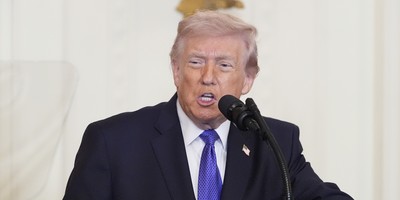A growing percentage of those Americans who oppose President Barack Obama believe the president is testing the envelope of acceptable domestic, constitutional and foreign policies. Staggering deficits measured in the trillions, unemployment measured almost in double digits and a weakening dollar measured in ever fewer ounces of gold are creating an economic crisis that is testing America's historic optimism and faith in a brighter future.

Public opinion rarely has been so volatile. Barack Obama went from political oblivion (a state senator) to being a vastly popular president of the United States in four years -- with the highest Inauguration Day Gallup approval numbers (68 percent approved; 12 percent disapproved) since Jack Kennedy a half-century ago.
But by last week, according to Gallup: "(The president's) 9-point drop (to 52.9 percent) in the most recent quarter (July 20 through Oct. 19) is the largest drop Gallup has ever measured for an elected president between the second and third quarters of his term, dating back to 1953. ... (It is) the steepest for a president at any point in his first year." He now hovers at just above the critical 50 percent approval.
A Rasmussen poll also reported last week that "26 percent of the nation's voters Strongly Approve of the way that Barack Obama is performing his role as President. That's the lowest level of Strong Approval yet measured for this President. Thirty-nine percent Strongly Disapprove. ... Fifty percent of Democrats Strongly Approve while 66 percent of Republicans Strongly Disapprove of his performance." Critically, "among those not affiliated with either major political party, 18 percent Strongly Approve and 42 percent Strongly Disapprove."
Unless, in an unlikely turn of events, the trend toward greater public stress reverses, by the November 2010 election fear and anger may grow to match or exceed that of 1968 -- the dreadful year of the assassinations of Bobby Kennedy and Martin Luther King; the ensuing race riots; the public violence, chaos and police riot of the Democratic National Convention in Chicago; and the election of Richard Nixon to the presidency of a dangerously divided country.
Recommended
I expect that both the Republican and Democratic national parties will be severely stressed in the tumultuous process. The Republicans already are struggling with the question of how closely to embrace the growing public wrath of anti-Obamaism. As Politico pointed out, "Many top Republicans are growing worried that the party's chances for reversing its electoral routs of 2006 and 2008 are being wounded by the flamboyant rhetoric and angry tone of conservative activists and media personalities."
My very good and wise friend Eddie Gillespie is quoted by Politico regarding his polling that "shows rising numbers of persuadable voters who are growing disenchanted with the Obama administration's policies but nevertheless remain invested in the president. 'Our party has to bring those voters along with a critique of policies, not the kind of harsh rhetoric the left used against former President Bush.'"
Is that wisdom or excessive caution? I'm not sure. But the political mood is beginning to feel to me like the late 1970s, when I was working on Ronald Reagan's campaign, which used bold language, starkly conservative policies and genuine passion. Then, too, many Republicans judged we would scare off the independent and undecided voters.
But in times of fear, anger and passion, the opposition party must stand with that passion -- not aside. There still will be calmer, moderate votes needed, as well, to win. And that is where the shrewdness and style of the party's leader or leaders may make the difference. But I strongly suspect that the GOP cannot (and, for me personally, should not) vote "present" when "the times they are a-changin'." As the Bob Dylan lyric goes, "Get out of the new (road) if you can't lend your hand."
The Republican Party is likely to spend the next few months tearing itself up over that question. But at the end of the process, I believe the party will correctly stand with the passion and conviction.
Nor will the Democratic Party get a pass this season. With a pre-existing, built-in resentful Clinton wing, the Democrats are just beginning to judge whether it will be electorally safe to be standing too closely with the president next Election Day.
The Senate vote last week on whether to ignore the quarter-trillion dollars of deficit caused by the Medicare bill was noteworthy -- and perhaps predictive. Fully 12 Democratic senators (and one independent who caucuses with the Democrats) voted against the president's position; they refused to ignore the growing deficit issue. If the president's Gallup numbers slip from 52 percent to 47 or 48 percent by the late winter or early spring, expect to see more and more Democratic politicians keeping their distance.
Worse for the Democrats, even without more problems domestically, the president may well lose 3 to 7 percent on his 52 percent job approval because of the string of foreign policy failures that are likely to befall him in the next six to 12 months (Afghanistan, the breakdown of Israeli-Palestinian negotiations, the failure to get Russian support for sanctions in the nuclear showdown with Iran, the crisis in eastern Europe as resurgent Russia humiliates eastern European neighbors and the United States -- perhaps a reversal in Iraq).
Our body politic is likely to be convulsed in the coming 13 months. And the price for both parties and politicians if they misjudge events and passions is going to rise.

























Join the conversation as a VIP Member